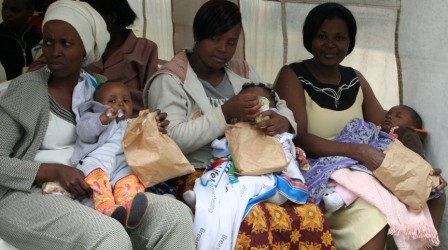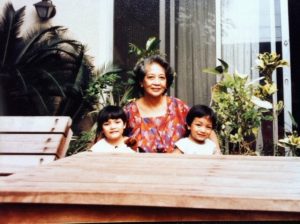
by Maryanne W. Waweru | Oct 29, 2015 | 2015, Advice, Africa, Culture, Kenya, Traditions, World Motherhood

Last Sunday, my closest friend became a mother for the first time. It has been excitement galore from all the people who know her: her family, her friends, her colleagues, neighbors, acquaintances, and just about everybody.
When I visited her in hospital, I found myself giving her all kinds of advice about motherhood from breastfeeding, to weaning, to walking, to teething, all that and more.
Then I quickly told her that I would add her to some Facebook groups that would be of great help to her as a new mum. I began by adding her to a group that is exclusive to Kenyan mums who are breastfeeding. As I did so, I amused myself at how Kenyan mums have turned Facebook into their go-to resource center.
There are plenty of Facebook groups by and for Kenyan mums whose membership constitutes a certain phase of the motherhood journey.
For example, when one is trying to conceive, there is a group to join. When she conceives, she then swiftly moves on to a group for pregnant mums. Once she has her baby, she moves on to the next group –that of breastfeeding mums. After that its a group dedicated to weaning, and where nutrition advice is offered –by fellow mums.
Then there are also larger groups made up of Kenyan mums with babies of whatever age, a general group where everything about motherhood is discussed. From schools, to detergents, to diapers, to cooking fat, tissue paper, to the very critical issue of house girls (nannies). Everything goes. Each of these groups have thousands of members, with one even having slightly over 90,000 members!
I have been in all of these groups, and I am still members in some of them.
In the traditional African setting of the past, new mums were guided into the motherhood journey by the older women around them: their mothers, their aunts, their grandmothers, older cousins and female neighbors.
However, in today’s society some of these traditional fabrics are slowly ebbing away.
More women have to work to supplement the family income, which leaves little option for staying at home to look after the children. In fact, we are seeing less and less of the special interactions between generations of women when it comes to raising her child.
Consequently, we are turning to our friends, our online friends, most of them strangers, for advice that would otherwise have been given to us by our ‘African mothers.’ Combine that with modern technology where access to the internet in many African urban cities is growing, and accessing information and connecting with mums online becomes inevitable.
Sometimes when I think about it, I believe it’s unfortunate, especially for those of us who live in the urban towns, that we no longer have easy access to those traditional pieces of motherhood advice that we would have received directly from our mothers. But, in turn, we are grateful about how the internet has made our parenting journeys significantly easier for our modern lifestyles. Because, it truly has. But, it is only natural to wonder if we may be missing out on something lost.
How has online motherhood support played into your experience as a mother?
This is an original post to World Moms Blog by contributor Maryanne W. Waweru of Kenya.
Photo credit of Kenyan women to the author.
Quote image credit to World Moms Blog.
Maryanne W. Waweru, a mother of two boys, writes for a living. She lives in Nairobi, Kenya with her family. Maryanne, a Christian who is passionate about telling stories, hopes blogging will be a good way for her to engage in her foremost passion as she spreads the message of hope and faith through her own experiences and those of other women, children, mums and dads. She can be found at Mummy Tales.
More Posts - Website

by Tara Bergman (USA) | Oct 9, 2015 | 2015, Boys, Celebrations, Childhood, Communication, Family, Gifts, Helping, Kids, Milestones, Parenting, Tara B., Traditions, USA, World Motherhood, Younger Children

My son turns 10 years old this fall. At the start of the summer, I told my husband that before school reconvened, I intended to have the talk with my son about Santa. While my son has never pushed for answers regarding holiday magic, he is in a multi-age program at school with older, brainy kids. My gut has been telling me that this is the year that Santa’s cover would be blown. I also know my son well enough to know I wanted to control the conversation and not have a big talking fifth grader accidentally ruin Christmas at the last minute. I wanted to work through this far enough away from the holiday so we could all get used to the idea. I knew if I framed things the right way, my son would still be able to welcome the upcoming holiday season. I was resigned to move ahead. (more…)
Tara is a native Pennsylvanian who moved to the Seattle area in 1998 (sight unseen) with her husband to start their grand life adventure together. Despite the difficult fact that their family is a plane ride away, the couple fell in love with the Pacific Northwest and have put down roots. They have 2 super charged little boys and recently moved out of the Seattle suburbs further east into the country, trading in a Starbucks on every corner for coyotes in the backyard. Tara loves the outdoors (hiking, biking, camping). And, when her family isn't out in nature, they are hunkered down at home with friends, sharing a meal, playing games, and generally having fun. She loves being a stay-at-home mom and sharing her experiences on World Moms Network!
More Posts

by Patricia Cuyugan (Philippines) | Jun 4, 2015 | 2015, Awareness, Being Thankful, Celebrations, Childhood, Education, Family, Grandparent, Gratefulness, Happiness, Identity, Inspirational, Life, Life Lesson, Marriage, Memories, Motherhood, Parent Care, Parenting, Philippines, Priorities, Relationships, Responsibility, Siblings, Time, Traditions, Womanhood, World Motherhood

The author and her brother, as children, with their paternal grandmother, Loli.
Among the greatest blessings I have ever had in this life is the time that I have spent with my grandmothers, Loli and Mama. They were two of the greatest women I have ever known.
Loli is my paternal grandmother, and Mama is grandma on my mom’s side of the family. While they are no longer around for me to hug, the lessons and wisdom that both have given me remain in my heart.
Today I share some of these lessons with my fellow world moms:
1. True love DOES exist
My maternal grandparents spent 68 years together before my Mama passed away. Those years of marriage were not perfect, and of course had their share of ups and downs. But on her deathbed, my grandmother opened her eyes and focused on my grandfather, sharing a final moment with him before she left us.
At the end of it all, we knew that there was no one in the world she loved more than him. We could feel that she didn’t want to leave him, and in the end, the assurance that he will be okay was what she needed in order to let go.
I will never forget the way my Mama’s eyes would twinkle each time she looked at my grand dad, how she would laugh at his jokes and hold his hand while they walked. Marriage is hard, but it can be worth it. And true love does exist.
2. Make sure to create memories with your loved ones
In my family, there is no shortage of photographs and stories to turn to when we want to remember fun times. I appreciate these so much more now that I am older.
My grandmothers made sure that we planned something for every occasion, be it Christmas, birthdays, or even random, ordinary Sundays. What mattered was that we made time for each other, and that we made our time together count.
3. Come what may, you can always count on family
There is comfort in knowing that your family will be there for you no matter what happens. We were raised to love one another unconditionally, and to watch each other’s backs. Our grandmothers had our parents make sure that it stayed this way, even as we all grew up.
We now pass these close family ties on to our children, who are not just cousins but also the best of friends. Truth be told, I cannot imagine what life would be like without my siblings and cousins.
4. Allow your children to be spoiled by their grandparents
This one is a tough pill to swallow, and I fought against it for many years with my own son and parents. But looking back, the best memories that I have of my grandmothers were those times I had alone with them, where I was the princess and got whatever I wanted.
When I was pregnant, my Loli would steal extra packs of lunch or save half of her share to bring home to me as treats after her meetings and get-togethers. My Mama indulged me in mini birthday celebrations in her home, complete with spaghetti, ice cream and cake, when I was already in my 30’s!
These are memories that I hold so dear. They have their own happy places in my heart and can never be taken away. Someday, I hope that my son remembers moments with my mom and mom-in-law with the same kind of fondness.
5. At the end of it all, love is what lives on
I’ve had my fair share of scolding and tough love from my grandmothers, but not once in my life did they ever make me feel unloved. I miss them each day, the nagging phone calls, their funny tales from the past, their hugs and kisses.
The love that they left behind lives on in me, and in each of us in the family. It’s what binds us together now and keeps us strong.
Theirs was the kind of motherly love that transcended generations, the kind of love that I, too, hope to give to my family through the years.

The author and her sister with their maternal grandmother, Mama
*In loving memory of Natividad F. “Loli” de Castro (1921-2008) and Presentacion T. “Mama” delos Santos (1929-2015)
This is an original post for World Moms Blog from our contributor in the Philippines, Mrs. C
The images used in this post are attributed to the author.
Patricia Cuyugan is a wife, mom, cat momma, and a hands-on homemaker from Manila, whose greatest achievement is her pork adobo. She has been writing about parenting for about as long as she’s been a parent, which is just a little over a decade. When she’s not writing, you can usually find her reading a book, binge-watching a K-drama series, or folding laundry. She really should be writing, though! Follow her homemaking adventures on Instagram at @patriciacuyugs.
More Posts
Follow Me:




by Melanie Oda (Japan) | Apr 17, 2015 | 2015, Awareness, Cooking, Cultural Differences, Culture, Domesticity, Expat Life, Eye on Culture, Family, Food, Health, Home, Identity, International, Japan, Life, Life Balance, Living Abroad, Maternal Health, Me-Time, Motherhood, Multicultural, SAHM, Social Equality, Stress, Time, Traditions, Womanhood, World Motherhood
 I start my morning here in Japan the same way every day: by cleaning out the drain trap.
I start my morning here in Japan the same way every day: by cleaning out the drain trap.
Not very pretty, I suppose, but I’ve learned the hard way that it needs to be done frequently and well. The drain traps here in Japan are metal mesh to prevent food from going down the drain. They get gross very quickly.
I’m pretty sure I started out my days when I lived in the US with a cup of coffee, which seems quite glamorous by comparison!
In spite of our gains in education or employment opportunities over the last century, much of our time as women gets taken up by mundane household tasks like this. Women all around the world are doing the same kind of things: laundry, food preparation, cleaning, child care, though in very different ways.
It makes me curious. How much of your time gets spent on “daily chores?” What kinds of things do you need to do every day? Do you do them alone, or do you have help?
Perhaps it is a boring topic, but for comparison I thought I would share a little bit of what housework is like here in Japan.
Laundry gets done daily in most families. We have washing machines, but most people don’t have dryers. In a country with cold winters, humid summers, and a rainy season, keeping up with the laundry feels like a daily battle! When the weather is not cooperative, laundry gets hung from curtain rails or any other overhang that can be found indoors. We have to bob and weave our way around the house. Imagine that Catherine Zeta Jones movie, but with laundry instead of lasers.
I do the shopping most days as well. This is quite common here in the greater Tokyo area, where storage space is limited and many people do not have cars to allow buying in bulk. Milk is sold by the liter; laundry detergent in 500ml bottles. The biggest shopping challenge is buying rice, which comes in 5 or 10kg bags.
I need to dust and vacuum every day. This is much more often than we did in the US growing up. I’m not sure why Japan is so dusty. Could it be the tatami floors? The single pane windows? The small living space? And more important than why, how can I make this dust accumulation stop?
Japanese cuisine seems to be gaining in popularity around the world. Many Japanese people eat a full meal in the morning (though this is slowly changing,) as well as at lunch and dinner. Japanese bento are also getting a lot of attention on the Internet for being nutritious as well as visually appealing. Overwhelmingly, the cooking is done by women. (Personally, since my children’s lunch is provided by the school, most days I cook twice.)
Like most families here, we have a gas stove-top, a rice cooker, and a microwave combined with an electric oven for cooking. My mother-in-law has a separate gas burner that can be placed on the table for doing things like sukiyaki or okonomiyaki, foods that are consumed as soon as they are cooked by the family from the same dish. My children are still a bit too small for me to attempt this at home.
I think many of us around the world are doing these same things, but the nitty-gritty of how we get it done and how often we do it are different. I can’t help but wonder what housework says about the values of the culture.
In the US, for example, many families take pride in a well-decorated home. In Japan that is much less important. (Perhaps because many women are spending all that time dusting and dodging laundry….)
What kinds of things are included in your daily duties? How do you feel about doing them?
This is an original post to World Moms Blog from our writer in Japan and mother of two, Melanie Oda.
The image used in this post is attributed to the author.
If you ask Melanie Oda where she is from, she will answer "Georgia." (Unless you ask her in Japanese. Then she will say "America.") It sounds nice, and it's a one-word answer, which is what most people expect. The truth is more complex. She moved around several small towns in the south growing up. Such is life when your father is a Southern Baptist preacher of the hellfire and brimstone variety.
She came to Japan in 2000 as an assistant language teacher, and has never managed to leave. She currently resides in Yokohama, on the outskirts of Tokyo (but please don't tell anyone she described it that way! Citizens of Yokohama have a lot of pride). No one is more surprised to find her here, married to a Japanese man and with two bilingual children (aged four and seven), than herself. And possibly her mother.
You can read more about her misadventures in Asia on her blog, HamakkoMommy.
More Posts

by Nancy Sumari | Apr 15, 2015 | 2015, Being Considerate, Being Thankful, Body Image, Family, Nancy Sumari, Religion, Tanzania, Traditions, Uncategorized, World Motherhood

Dear Zuri Gabriella,
You are 4! Just like that, in a blink of an eye. Now, before Dad and I blink again, and you are moving out of the house, please indulge me as I share my birthday wishes for your life as you grow.
Love God. Your faith and trust in Him will sustain you through this life. Pray for everything and sometimes pray for nothing.
Be Kind. I think you are the most beautiful girl in the world, but beauty is nothing without kindness. Be kind. Be gentle.
Be Happy. As you demonstrate every day, happiness is in the little things. Keep still; be centered. Happiness is all around.
Love Yourself. It is important, my darling girl, to see yourself through your own eyes, and to love yourself with your own heart.
Be Of Significant Service. Live a life of purpose. Your father and I will continue to raise you to understand the importance of serving others, especially those in need. Know that your service is of significance.
Do The Right Thing. This is not always easy. Even Mamma has made–and will continue to make–a lot of mistakes! You will, too. Everyone does. But, I strive to do the right thing and to be quick to apologize when I fail. As you always say, it’s important to “be nice.”
Love you always,
Mamma
This is an original post to World Moms Blog. Photo credit to the author.

by Jacqueline Jenkins (Jordan) | Mar 4, 2015 | 2015, Jordan, Technology, Traditions, Uncategorized, World Motherhood
 Outside Amman, the capital city of my new home, life continues to unfold much as it has for centuries. Or so it seems at first glance.
Outside Amman, the capital city of my new home, life continues to unfold much as it has for centuries. Or so it seems at first glance.
Recently, during a trip to Wadi Rum and Petra, we met and dined with many local Bedouin people. For dinner, they invited us to share the meat of a sheep which had been freshly slaughtered for our visit. Our hosts had different histories and journeys that brought them around the fire pit, but they all shared a wonderful pride for their country, their renowned hospitality, and their treasured historical and geological landmarks.
Mubarak, a man about my age, with a weathered face and kind, soft eyes, talked to me for hours around the fire. He told me of his family’s history, the way he grew up moving from one part of the desert to another during different parts of the year, herding sheep and searching for firewood. He talked of the Bedouin people’s common ancestry and desire to keep traditions alive, and about his favorite sand dune in the whole desert–his eyes clouded over as he recalled memories of the spot and described how the sand is as fine as flour. Then, without even a second thought, he grabbed his mobile phone out of his flowing, white shirt and asked if I would like to Skype with his friends Robert and Dee in Mexico.
To me, two worlds collided.
I couldn’t help but fall back on my elbows and laugh.
My children, like yours, are growing up in an ever-changing world. Preserving unique cultures, traditions and practices is becoming more difficult as we connect digitally through Skype, Facebook, What’sApp and other technology.
I see technology as a great equalizer, an incredible tool for those in the developing world–but also as something to treated with great care if we are to preserve the traditional practices in the world.
What do you do with your children to preserve family or cultural traditions? Does technology help or hinder your efforts?
Photo credit to the author. This is an original post to World Moms Blog.

We are a few months into our new 'home of our heart' location in Amman, Jordan. Originally from Canada, I have been moving around the globe for more than twenty years as my husband works for UNICEF. While we were a carefree couple in Uganda, Lesotho and Bangladesh, Meghan joined our family in 2000, while we were living in Myanmar. She was joined in 2005, while we were posted in India by Charlie, her energetic younger brother! Since then we have lived in Mozambique and New York. I am an educator and have been incredibly fortunate to have found rewarding jobs in international schools wherever we have been posted. Most recently I was the Elementary School Principal at the United Nations International School in Manhattan. Since arriving in Jordan, I have been a stay at home Mum, exploring, photographing and learning about the incredible history of the region and the issues facing not only the Jordan population but the incredible number of Syrian refugees currently residing in the country. While I speak English and French, I have not yet started to learn Arabic; a big goal for our time here.
I write to record and process this incredible journey we are on as a family. Time passes so incredibly quickly and without a recording of events, it's hard to remember the small moments and wonderings from each posting. Being a mother in this transient lifestyle means being the key cheerleader for our family, it means setting up and taking down a house with six weeks notice, it means creating close friendships and then saying goodbye. All this, while telling yourself that the opportunities your children have make the goodbyes and new hellos worthwhile. Raising a child in this lifestyle has incredible challenges and rewards. The challenges include culture shock every single time, even when you feel the move will be an easy one. It means coaching yourself, in your dark moments to be present and supportive to your children, who have not chosen to move but are trusting you to show them the world and the meaningfulness of the lifestyle we have committed to as a UNICEF family. The upsides to this lifestyle are incredible; the ability to have our children interact and learn about cultures, languages, food, and religions firsthand, the development of tolerance and empathy through relationships with many types of different people and the travel, they have been to more places before the age of ten than some people do in a lifetime! My commitment to raising children who believe in peace and feel responsible for making a difference in creating a better world is at the core of everything I do.
More Posts
Follow Me:





















